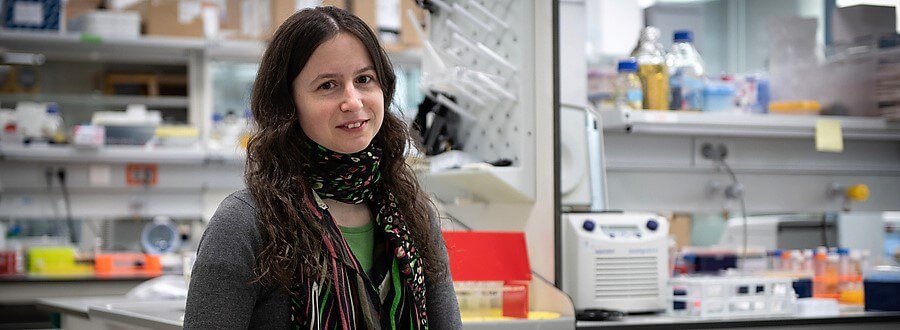
IRB Barcelona opens a new laboratory to strengthen its expertise in immunology
Dr. Stefanie Wculek will head the IRB Barcelona’s new Innate Immune Biology lab, focused on the immune system and its function in tissues, both in health and in response to disease, a key emerging research field as it serves to bridge the science conducted in the laboratories with clinical practice. Including this new group, the institute, based in the Barcelona Science Park, has launched four new laboratories on frontier research fields in the last two years.
The immune system is a complex network of cells, tissues, and organs that help our bodies fight infections and other diseases. Immunotherapy, which is based on stimulating the body’s own immune system, is gaining status as a key approach for cancer treatment. Stimulation of the immune system could also be used to treat a wide range of other diseases, such as autoimmune disorders, or to prevent rejection in organ transplants. In this context, an in-depth understanding of the functioning of the immune cells that participate in these processes is crucial to prevent diseases and find new therapeutic tools.
The IRB Barcelona’s new Innate Immune Biology lab, headed by Dr. Stefanie Wculek (Austria, 1984), will study the innate immune system, that is, our body’s first defence system, and the cells that make it up, such as macrophages, dendritic cells, and neutrophils. The laboratory will center on the functions of these cells in different tissues, how they work to keep the body healthy, and how they react during non-infectious diseases and other aggressions, such as cancer, ageing, wounds, or obesity.
“Immune cells are involved in many processes, which is why I am especially interested in the multidisciplinary nature of this institute, which studies cancer, ageing, and metabolic processes. I look forward to collaborating with many of the labs here and contributing my knowledge to biological questions and complex scenarios,” says Dr. Wculek.
Dr. Wculek‘s laboratory has been set up with the strategic support and commitment of the “la Caixa” Foundation through its “CaixaImpulse Clinical Translation” programme, which promotes research that is closer to having an impact in clinical practice and the patients’ lifes.
“It’s a great honour for me to be able to join IRB Barcelona and be surrounded by researchers who I admire so much. I am enormously grateful to the “la Caixa” Foundation for giving me this opportunity,” she adds.
The TRIP initiative
Dr. Wculek‘s appointment is part of the emergent Translational Research and Innovation Programme (TRIP) launched by IRB Barcelona with the support of “la Caixa” Foundation and the Department of Health of the Government of Catalonia. TRIP is a strategic project that seeks to transfer the knowledge generated in laboratories and public research centres to clinical practice in the most efficient way and in the shortest possible time. To this end, TRIP will focus on promoting emerging research areas such as immuno-oncology, inflammation, and cellular senescence.
In addition to opening a new laboratory devoted to immunology, TRIP will host three joint research projects between scientists at IRB Barcelona and medical researchers at any hospital in Catalonia. In this regard, the programme promotes basic and clinical research activities in the same environment and facilitates joint access to knowledge, technologies, and applications. The projects and names of the scientists who will be part of these three groups will be announced in the coming weeks.
Dra. Wculek’s career
Dr. Wculek joins IRB Barcelona from the National Center for Cardiovascular Research (CNIC), where she took up a postdoctoral researcher position in Dr. David Sancho‘s laboratory back in 2016. During her time there, she received a Junior Leader grant from “la Caixa” Foundation and specialised in studying the immune system. Specifically, in how dendritic cells and macrophages deal with non-infectious diseases and also how they work in their basal state—when there is no damage or aggression to deal with—to maintain optimal condition of tissues. Referring to her mentor, Dr. Sancho, Dr. Wculek notes that she has learned “Not to be afraid to try new ideas. Any knowledge brings you one step closer to the solution”. She will continue to collaborate with him on the projects she starts in her new laboratory.
CNIC was not her first experience in Spain. She had previously done her master’s project in Dr. Erwin Wagner‘s team at CNIO, in Madrid. Later, she went on to complete her doctoral studies at the London Research Institute (now part of the prestigious Francis Crick Institute) in Dr. Ilaria Malanchi‘s laboratory. “I was one of Ilaria’s first PhD students. We worked hand in hand for 4 years and I learned a lot. Among other things, I learned to think creatively and also about the importance of persistence. It was really inspiring,” says Dr. Wculek.
IRB Barcelona’s strategy
Including Dr. Wculek‘s group, IRB Barcelona has launched four new laboratories in the last two years, these focused on frontier research fields, namely targeted protein degradation, stem cell memory and epigenetics in hematopoiesis, immunity and leukemia, and inflammation and cell plasticity in cancer. All four laboratories are led by highly talented young researchers.
In its first months of operation, the new laboratory will be recruiting a couple of doctoral students, one or two postdoctoral researchers, a laboratory manager, and a technician with experience in immunology, metabolism, and computational biology. IRB Barcelona now has 28 laboratories and 9 scientific platforms that put cutting-edge technology at the service of the most ambitious research.




